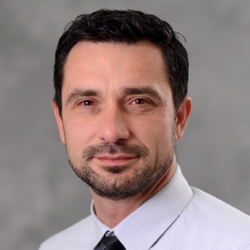Aug 23

Angioimmunoblastic T-cell Lymphoma
Posted by Dr. Andrei Shustov
Angioimmunoblastic T-cell Lymphoma
Angioimmunoblastic T-cell lymphoma (AITL) is a sub-type of peripheral T-cell lymphoma (PTCL) with characteristic appearance under the microscope and unique clinical symptoms. It is rare, comprising 10-15% of all T-cell lymphomas and only 1-3% of all non-Hodgkin lymphomas. It usually affects older people but may be seen in younger age.
Patients with AITL can present with both typical “lymphoma symptoms” of lymph node enlargement, fatigue and poor appetite, and “specific AITL-symptoms”. The latter stem from an abnormal and excessive immune system stimulation by lymphoma cells and can consist of one or more of the following: skin rash, joint pains and swelling, accumulation of fluid around the lungs (pleural effusions) or in the stomach cavity (ascitis), low red blood cell count (anemia) from immune destruction, and some others.
Lymph node excision (as opposed to needle biopsy) is required to establish the diagnosis. Under the microscope, tumor cells appear to be surrounded by a convoluted meshwork of small blood vessels (hence, the name “angio” – blood vessel). There are usually large virus-infected cells that are scattered around – immunoblasts (second half of the name – immunoblastic) that are believed to be a part of the tumor process. Special stains and additional tests (flow cytometry and molecular studies) are frequently required to make a right diagnosis.
After the diagnosis is established, it is necessary to determine how widely the lymphoma has spread through the body. This is called staging and is accomplished via CT scans and PET scans, as well as bone marrow biopsy. Staging is important in deciding on therapy and predicting the risk of relapse after therapy and/or probability of cure. Additional blood tests will further define the prognosis that in turn will be useful in discussing the acceptable risks of treatment.
Once diagnosis and staging are completed, treatment should start promptly in the majority of patients to avoid further progression of the lymphoma and possible effects that it can have on organs and body systems. Most of the patients would be treated with a combination of several chemotherapy drugs and steroids (prednisone). Treatment is done in cycles (usually every 3 weeks) and will typically contain 6-8 cycles. The majority of patients will have an initial response to treatment with shrinkage of the lymph nodes and disappearance of lymphoma-related symptoms (i.e. rash, itching, sweats, joint pains, etc…), with some of the patients achieving complete remission (disappearance of all signs of lymphoma).
If you achieve a response (partial or complete) to initial treatment ask your physician whether bone marrow transplantation is the right thing to do in your particular case. Referral to academic centers specializing in T-cell lymphomas might be useful in making that decision. There is still controversy, even among the experts, on the issue of transplantation and a decision should be made with understanding of all the pros and cons of this complicated procedure.
If your AITL lymphoma relapsed after initial remission or did not respond to first treatment, a consultation with lymphoma and bone marrow experts is very important to determine the most appropriate course of action based on the characteristics ofyour particular disease, age, other medical conditions that you might have and especially your own philosophy and preferences as it pertains to risks of therapy and probability of cure. In general, relapsed lymphoma remains potentially curable; however, required approaches are significantly more aggressive and therefore riskier than the initial treatment.
AITL cure remains elusive in the majority of patients. It is therefore very important to ask about second opinion consultations from experts specializing in managing lymphomas (click here for a list of specialists) and to inquire about available clinical trials of new drugs and approaches.

 Join our mailing list.
Join our mailing list.
